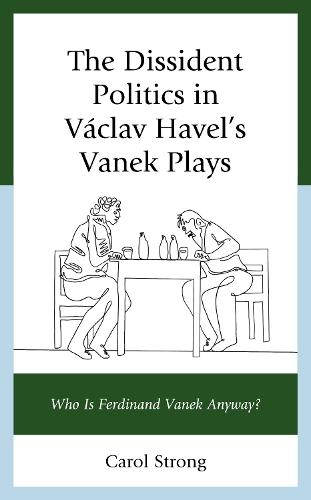Full Product Details
Author: Carol Strong
Publisher: Bloomsbury Publishing Plc
Imprint: Lexington Books
Dimensions:
Width: 15.80cm
, Height: 3.30cm
, Length: 23.90cm
Weight: 0.685kg
ISBN: 9781793650207
ISBN 10: 1793650209
Pages: 336
Publication Date: 05 September 2023
Audience:
Professional and scholarly
,
Professional & Vocational
Format: Hardback
Publisher's Status: Active
Availability: Manufactured on demand

We will order this item for you from a manufactured on demand supplier.
Reviews
Strong’s original and well-researched book offers a comprehensive examination of the Czech literary character Ferdinand Vanek and his nine iterations in the period 1975–1985. First created by Václav Havel as his alter ego in the trilogy Audience, Vernisáž, and Protest, Vanek takes on a new life in the sequel plays of Havel’s fellow dissidents, Pavel Kohout, Pavel Landovský, and Jirí Dienstbier. The study concludes with a virtual post-production panel discussion on the many faces of Vanek. To the question “Who is Ferdinand Vanek?”—asked at the opening of the book—Strong provides many insightful answers. Vanek was not conceived as merely literary representation of Havel’s dissident experiences, but rather as a dramatic principle able to prompt others to reveal their innermost thoughts. As an embodiment of the linkage between literature and politics, Vanek serves as an inspirator of social reform in a politically repressive environment, hence, his enduring legacy. Recommended. Lower-division undergraduates through faculty; general readers. * Choice Reviews * In this thought-provoking and well-researched book, written partly in a quasi-theatrical format, Carol Strong demonstrates how this intersection of politics and literature – focusing on Havel and three other leading Czechoslovak dissidents (Pavel Kohout, Pavel Landovský and Jirí Dienstbier) - played a key role in the eventual downfall of the Communist Party in 1989. And in better understanding Havel’s creation Ferdinand Vanek – who was based on Havel himself and was subsequently adopted by several other writers - we understand better the complexities of this impressive man and his fellow-dissidents, as well as the power, significance and universality of absurdist theater. -- Leslie Holmes, University of Melbourne “The Dissident Politics in Václav Havel’s Vanek Plays: Who Is Ferdinand Vanek Anyway?by Carol Strong maps out Ferdinand Vanek's import as both a concretely realized dramatic character in Havel's plays as well as a dramatic principle deployed by other dissident writers who were Havel's contemporaries. It also explores how Vanek continues to speak to us in the post-1989 globalized world. In an era where dissent is (still) endemic, this study of the Vanek plays as ""existential encounters"" may well serve as a source of wisdom and inspiration for dissidents, both actual and would-be, in the here and now.“ -- David S. Danaher, University of Wisconsin-Madison “Carol Strong’s The Dissident Politics in Václav Havel’s Vanek Plays: Who Is Ferdinand Vanek Anyway?, has opened the door to the world of Ferdinand Vanek; a fragile, shy, but in a way determined and stubborn intellectual confronted with the surrounding political realities. This book is complex, marvelous, and enriching. Its main point is that Ferdinand Vanek was more than a theatrical projection of Havel’s inner self, a dramatic figure that can help us to get a deeper insight of his personality. We are reminded by Strong that there are three other authors here, too, who contributed substantially to the Vanek's theatrical etudes, offering the portraits of Vanek not from inside, but as seen by the other people: Havel's friends and teammates. The message sent out by all four authors of Vanek plays, Václav Havel, Pavel Kohout, Pavel Landovský and Jirí Dienstbier, is universal. It speaks to every reader, no matter how far he or she is from that place and time, where and when this message originated. I enjoyed reading it tremendously. So, enjoy it, too, observing the actions and reflections of Ferdinand Vanek with an open mind and generous imagination.” -- Martin Palouš, Florida International University “The Czech people hold great admiration for Václav Havel, the playwright and former president. Furthermore, we hold scholars who analyze Havel's work in high regard, as they help to disseminate our cultural heritage and promote a deeper understanding of it. Carol Strong has executed this task masterfully, particularly in her treatment of the Vanek plays, which feature Havel's alter ego Ferdinand Vanek, and which were performed during a time of significant social upheaval. These one-act-plays, written by Havel himself, along with Pavel Kohout, Pavel Landovský, and Jirí Dienstbier, were considered subversive due to their subject matter, which was critical of the communist totalitarian regime. This is one of the reasons why the plays are still being performed today."" -- Lenka Jungmannová, The Institute of Czech Literature, CAS
In this thought-provoking and well-researched book, written partly in a quasi-theatrical format, Carol Strong demonstrates how this intersection of politics and literature – focusing on Havel and three other leading Czechoslovak dissidents (Pavel Kohout, Pavel Landovský and Jiří Dienstbier) - played a key role in the eventual downfall of the Communist Party in 1989. And in better understanding Havel’s creation Ferdinand Vaněk – who was based on Havel himself and was subsequently adopted by several other writers - we understand better the complexities of this impressive man and his fellow-dissidents, as well as the power, significance and universality of absurdist theater. -- Leslie Holmes, University of Melbourne
Author Information
Carol Strong is professor of Political Science at the University of Arkansas at Monticello (UAM).



